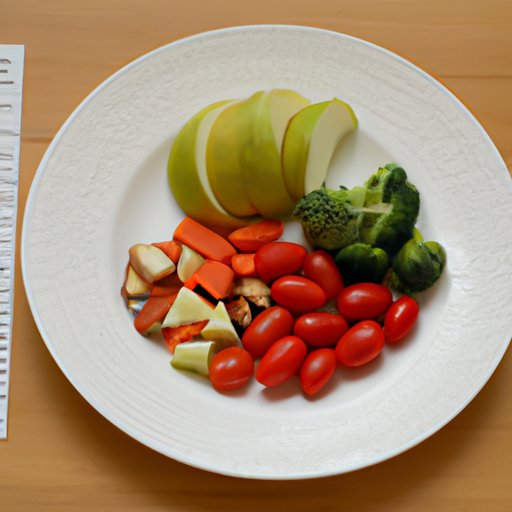Introduction
The idea of losing weight is often associated with extreme diets or strenuous exercise, but there is also a simpler way: eating healthy. Making healthy food choices can have a tremendous impact on your weight loss efforts, and you don’t have to deprive yourself of delicious meals or snacks. With the right strategies, you can create a meal plan that helps you reach your weight loss goals while still enjoying tasty, nutritious foods.

Exploring the Benefits of Eating Healthy for Weight Loss
Eating a balanced diet that is full of nutrient-rich foods has many benefits for weight loss. These include improved digestion, increased energy levels, and better overall health. Let’s take a closer look at the advantages of eating healthy for weight loss.
Nutrient-Rich Foods
When it comes to weight loss, not all calories are created equal. Eating nutrient-rich foods such as fruits, vegetables, whole grains, and lean proteins will help ensure that you are getting all the essential vitamins and minerals your body needs to stay healthy and energized. According to a study conducted by the Harvard School of Public Health, “diets rich in fiber-filled fruits and vegetables, whole grains, and lean protein may prevent weight gain or even promote weight loss.”
Calorie Control
Eating healthy can also help you control your calorie intake. Choosing nutrient-dense foods means that you can eat more and still consume fewer calories. For example, a one-cup serving of cooked brown rice contains about 216 calories, whereas a one-cup serving of cooked white rice contains 242 calories. So, by choosing nutrient-rich brown rice over white rice, you can save 26 calories per serving.
Improved Digestion
Eating healthy can also improve your digestion, which can help with weight loss. Fiber-rich foods such as fruits, vegetables, and whole grains can help keep your digestive system running smoothly, and they can also help you feel fuller for longer. A study published in the Journal of the American Dietetic Association found that “increasing dietary fiber intake was associated with decreased body weight and body fat.”
Increased Energy Levels
Eating healthy can also lead to increased energy levels, which can help you stay active and burn more calories. When you fuel your body with nutrient-rich foods, you will have more energy throughout the day, making it easier to stay active and reach your weight loss goals. A study published in the British Journal of Nutrition found that “high-fiber diets are associated with higher levels of physical activity and lower levels of sedentary behavior.”

How to Lose Weight by Eating Healthy Foods
Now that we’ve explored the benefits of eating healthy for weight loss, let’s look at some practical strategies for putting this knowledge into action. Here are some tips for making smart food choices that can help you reach your weight loss goals.
Choosing Nutrient-Dense Foods
The key to successful weight loss through healthy eating is to choose nutrient-dense foods. These are foods that are high in vitamins, minerals, and other essential nutrients, but low in calories. Some examples of nutrient-dense foods include leafy greens, beans, nuts, and fish. Adding these types of foods to your diet can help you get the nutrition you need without consuming too many calories.
Limiting Processed and Refined Foods
It’s also important to limit processed and refined foods, such as white bread, chips, and candy, which are typically high in calories and low in essential nutrients. When you do indulge in these types of foods, make sure to practice portion control and balance them out with healthier options.
Making Smart Snack Choices
Snacking can be an important part of any healthy eating plan. However, it’s important to choose the right snacks. Instead of reaching for processed snacks like chips or candy, opt for nutrient-dense snacks such as fruits, nuts, or yogurt. This will help keep you full and satisfied throughout the day and prevent you from overeating at mealtime.

Creating a Meal Plan for Successful Weight Loss Through Healthy Eating
Creating a meal plan can be a great way to ensure that you are getting all the nutrients you need while also controlling your calorie intake. Here are some tips for creating a successful meal plan for weight loss through healthy eating.
Determining Calorie Needs
The first step in creating a meal plan is to determine your daily calorie needs. This will help you figure out how much food you should be eating each day. The average adult needs about 2000-2500 calories per day to maintain their current weight. To lose weight, you will need to reduce your calorie intake. Your doctor or a registered dietitian can help you determine the right amount of calories for your individual needs.
Planning Balanced Meals
Once you know your calorie needs, you can start planning balanced meals. Aim to include a variety of nutrient-dense foods, such as fruits, vegetables, whole grains, and lean proteins. Try to limit processed and refined foods, and focus on foods that are low in added sugars and saturated fats. This will help ensure that you are getting all the essential nutrients your body needs for optimal health.
Scheduling Regular Meals
It’s also important to stick to a regular meal schedule. Eating at regular intervals throughout the day can help you avoid overeating and keep your metabolism running smoothly. Aim to eat three meals and two snacks per day, spaced out evenly throughout the day.
Examining the Role of Exercise in Combination with Healthy Eating for Weight Loss
In addition to eating healthy, exercising regularly can also help you reach your weight loss goals. Exercise can help you burn calories, build muscle, and improve your overall health. Let’s take a look at the benefits of exercise and how to incorporate it into your routine.
The Benefits of Exercise
Regular exercise has many benefits for weight loss, including burning calories, building muscle, and improving overall health. It can also help boost your mood, increase your energy levels, and reduce stress. According to a study published in the journal Obesity Reviews, “exercise is associated with reduced body weight and fat mass, independent of dietary changes.”
Incorporating Exercise into Your Routine
To reap the benefits of exercise, it’s important to find an activity that you enjoy and make it part of your regular routine. This could be anything from walking or jogging to swimming or biking. Aim to get at least 30 minutes of moderate-intensity exercise five days a week. If you’re just starting out, begin slowly and gradually increase your intensity and duration as you become more comfortable.
Understanding the Impact of Stress on Weight Loss Through Healthy Eating
Stress can also play a role in weight loss. Stress can lead to unhealthy eating habits, such as overeating or skipping meals, which can make it difficult to reach your weight loss goals. Let’s look at the role of stress in weight loss and some strategies for managing it.
The Role of Stress in Weight Loss
When you are stressed, your body releases hormones such as cortisol, which can cause you to crave sugary, high-calorie foods. According to a study published in the journal Obesity, “chronic stress is associated with increased food consumption and body weight gain.”
Coping Strategies for Stress Management
Managing stress is key to successful weight loss. There are many ways to reduce stress, such as yoga, meditation, deep breathing exercises, and spending time in nature. It’s also important to get enough sleep and make time for activities that you enjoy. These strategies can help you stay focused and motivated on your weight loss journey.
Analyzing the Role of Genetics and Healthy Eating for Weight Loss
Finally, it’s important to understand the role of genetics in weight loss. While eating healthy and exercising regularly can help you reach your weight loss goals, your genes can also influence your body’s response to these efforts. Let’s look at the influence of genetics and how to establish a healthy diet despite them.
The Influence of Genetics
Genetics can affect your body’s response to diet and exercise. For example, some people may find it easier to lose weight than others, due to their genetic makeup. According to a study published in the journal Nature Genetics, “genetic variants have been associated with weight gain and obesity.”
Establishing a Healthy Diet Despite Genetics
Despite the influence of genetics, it is possible to establish a healthy diet and reach your weight loss goals. Eating a balanced diet that is rich in nutrient-dense foods and limiting processed and refined foods can help you reach your goals, regardless of your genetic makeup. Additionally, regular exercise and stress management can also help you achieve your desired results.
Conclusion
Losing weight doesn’t have to mean depriving yourself of delicious meals or snacks. Eating healthy is a safe and effective way to reach your weight loss goals. By making smart food choices, creating a meal plan, incorporating exercise into your routine, and managing stress, you can be well on your way to achieving your desired results. Remember, no matter your genetic makeup, you can reach your weight loss goals by eating healthy.
(Note: Is this article not meeting your expectations? Do you have knowledge or insights to share? Unlock new opportunities and expand your reach by joining our authors team. Click Registration to join us and share your expertise with our readers.)
